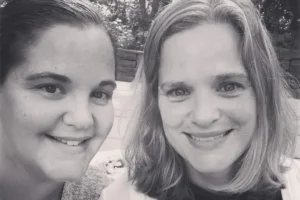The importance of one-on-one peer mentorship for individuals impacted by cancer cannot be overstated. It is more than just advice; it’s a beacon of hope and a powerful tool that plays a crucial role in closing the cancer care gap. Peer mentorship addresses various aspects of the patient experience and can make a positive difference for people affected by cancer at any point along the continuum of care— as well as addressing the unique needs of post-treatment survivorship. Peer mentors are testaments to resilience. They offer empathy and a profound sense of understanding. In a world where the journey seems daunting and isolating, a peer mentor is a steadfast reminder that you are not alone.
Emotional Support:
Cancer can be isolating and frightening. Speaking with a peer mentor who’s been through a similar cancer experience can help patients and their loved ones feel less alone on their journey. They offer a unique level of understanding and empathy. Connecting with someone who’s walked a similar path is vital to helping patients and caregivers deal with the psychological impact of a cancer diagnosis.
“My peer mentor and I had very similar experiences. It was so easy having a conversation with someone who understands what you’re going through. And, that person having a positive outcome is a relief.”
Information and Insight:
Understanding the complexities of the healthcare system and making informed decisions about care can be overwhelming. A peer mentor can share their own experience and help guide patients through the labyrinth, providing practical insights and valuable information.
“I was matched with someone I could relate to, and my peer mentor answered all of my questions. She helped make me feel that I wasn’t alone and that everything I was feeling was normal. There were a lot of questions I had that were weighing on me and my mentor helped alleviate that stress by answering my questions.”
Self-Advocacy:
A cancer diagnosis can come with a sense of vulnerability. Peer mentors can help empower patients and provide support that encourages them to become better self-advocates. By sharing their experiences with navigating medical appointments, effectively communicating with their healthcare providers, asking questions, and expressing concerns, peer mentors help patients find their voice in the healthcare system. Peer mentors can serve as role models, inspiring confidence and resilience in patients as they face the challenges of their cancer journey.
“My peer mentor gave me a lot of confidence based on his personal experiences. It’s all about confidence, isn’t it?”
Practical Coping Strategies:
Peer mentors can provide practical advice on managing side effects, dealing with treatment-related challenges, and coping with the emotional toll of cancer. This personalized guidance can significantly enhance a patient’s ability to manage the complexities of their unique situation. They may also offer coping strategies, share stress-relief techniques that worked for them, and lend a supportive ear. They can help close the cancer care gap by contributing to a patient’s overall well-being, positively impacting their ability to cope with the challenges of cancer care.
“My peer mentor was generous and compassionate. I know I can text her if I need a supportive ear. She was honest and I needed that. Having a person to talk to about this who has lived experience to share is immensely helpful.”
Community:
One-on-one peer mentorship creates a sense of community among individuals impacted by cancer. This community support helps to bridge gaps in cancer care by fostering collaboration and resource-sharing. Peer mentors also contribute to raising awareness of the specific challenges faced by the cancer community, helping to identify gaps and promoting a more patient-centered approach to cancer care.
“My peer mentor was so kind and understanding of all my fears. She was patient, answered questions, and shared some of her experiences. She made me feel like I wasn’t so alone.”
Peer mentors who provide one-on-one support play a powerful role in the effort to close the cancer care gap by providing tailored emotional support, sharing practical insights based on similar experiences, empowering patients to become strong self-advocates, and fostering a sense of community. This personalized approach promotes a more holistic and patient-centered model of cancer care.
If you or someone you love is affected by cancer and would like to connect with a trained Peer Mentor, please visit Cancer Hope Network online at www.cancerhopenetwork.org or call 877-HOPENET.
About Cancer Hope Network
Cancer Hope Network provides free and confidential 1:1 peer support for cancer patients, survivors, and those who love them. Our trained survivor and caregiver volunteer mentors provide support from diagnosis, through treatment and into survivorship. They have faced more than 98% of the cancers that will be diagnosed in 2023, speak 15 languages, and are prepared to offer hope and guidance through a wide variety of challenges that accompany a cancer diagnosis.
All volunteer and client matches are overseen and supported from beginning to end by a team of healthcare and social work professionals. For more information about Cancer Hope Network and its mission, please visit https://cancerhopenetwork.org/





